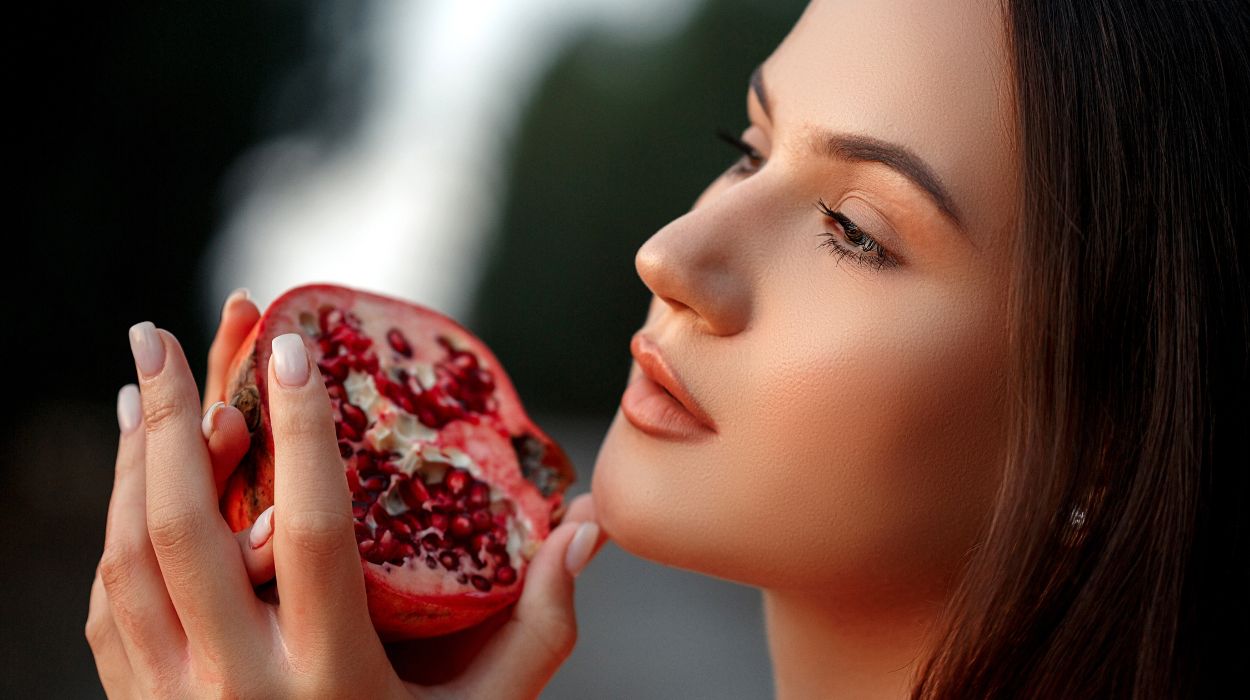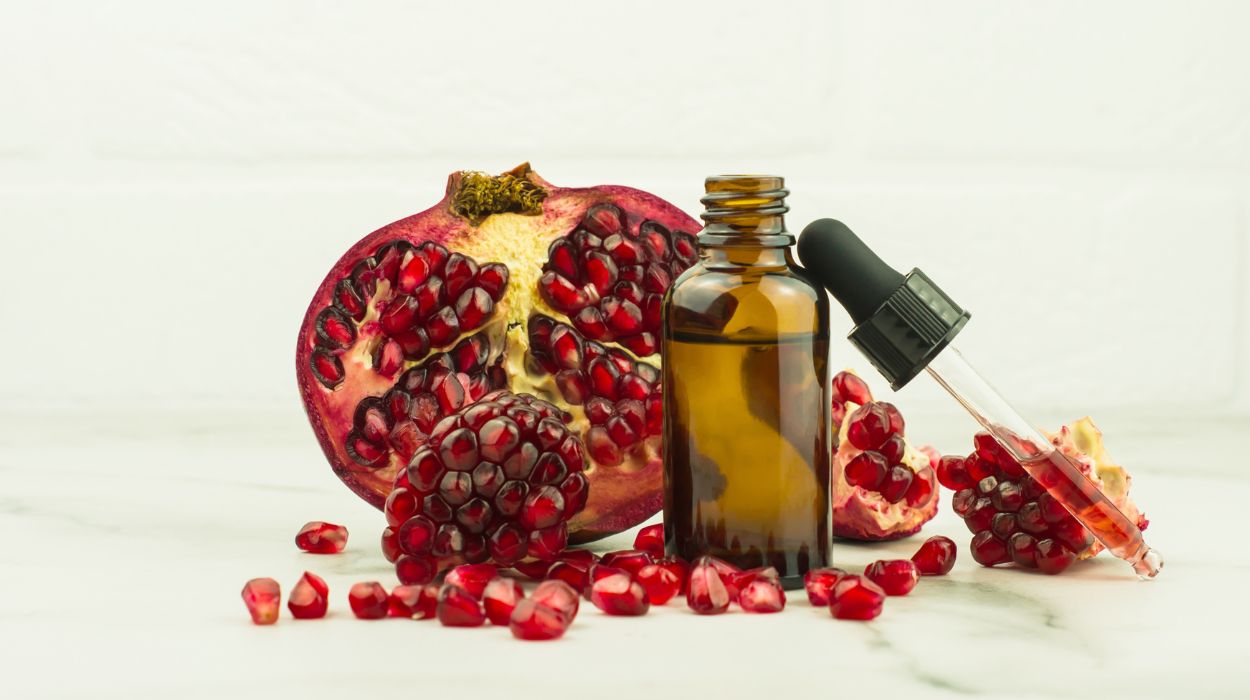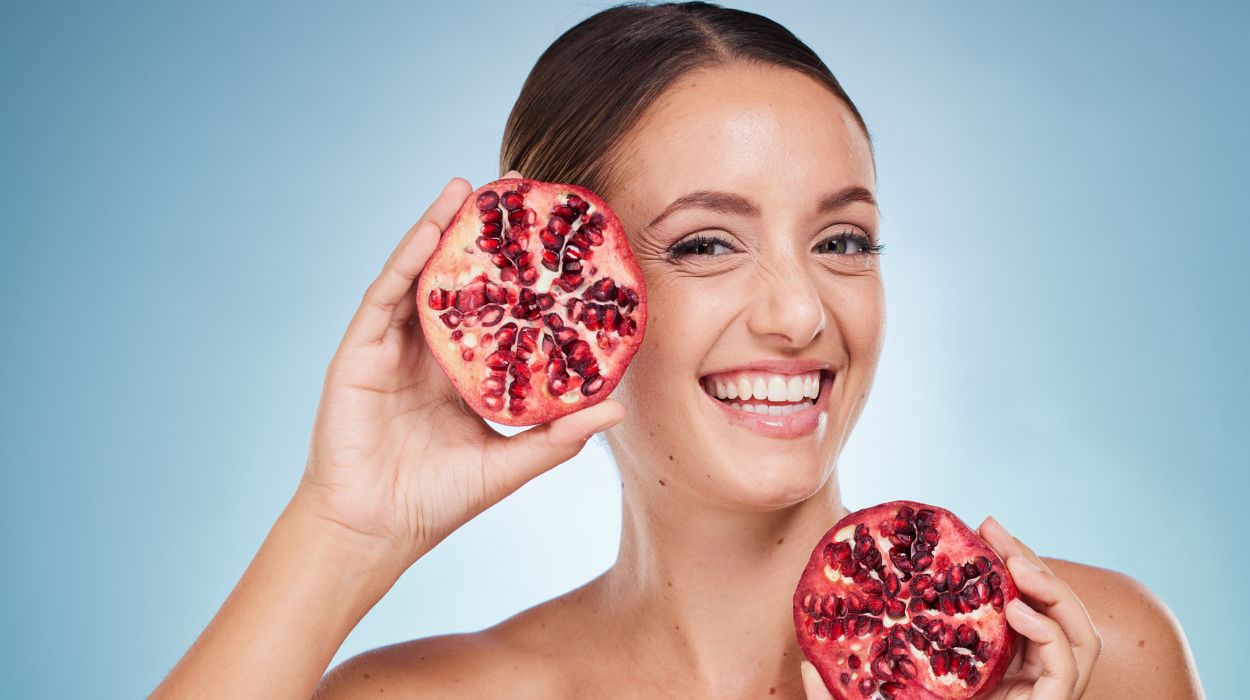Nothing beats natural when it comes to skincare. Many fruits and natural ingredients are popular for their cosmetic and therapeutic skin benefits.
Pomegranates are one of the healthiest fruits, rich in polyphenols, vitamins, and minerals. Beyond its exquisite taste, this jewel-toned fruit nourishes and revives your skin. Its high antioxidant content effectively combats free radicals, protecting your skin from environmental damage and premature aging.
The rich nutritional content in pomegranate seeds and peels stimulates collagen production, aiding in maintaining skin elasticity and strength. Its natural anti-inflammatory properties relieve skin irritation, acne, and eczema. Additionally, the fruit’s ability to enhance skin hydration and improve overall texture has made it popular in skincare routines.
Pomegranate benefits for skin are numerous. In this article, we discuss how to use pomegranates to enhance the look and health of your skin.
Pomegranate Benefits For Skin
Pomegranate (Punica granatum L.) offers various skin benefits thanks to its rich antioxidants, including polyphenols and vitamin C. Pomegranates contribute to skin health because they:
- Are rich in antioxidants.
- Boost collagen.
- Hydrate the skin.
- Prevent sun damage.
- Prevent acne.
- Are anti-aging.
- Regenerate cells.
- Lighten skin.
Pomegranate Skin Benefits

Pomegranate (Punica granatum L.) offers various skin benefits thanks to its rich antioxidants, including polyphenols and vitamin C. Pomegranates contribute to skin health as follows:
Rich In Antioxidants
Pomegranates contain vitamin C and antioxidants,[1] including anthocyanins, ellagic acid, and tannins. Antioxidants protect cells by neutralizing free radicals, reducing oxidative stress and, therefore, premature aging.
Therefore, pomegranates contribute to a healthier and more vibrant complexion. They aid in protecting skin cells from environmental factors, such as UV rays and pollution, promoting skin health and potentially slowing aging.
Boosts Collagen
Pomegranates contain antioxidants, especially vitamin C,[2] which stimulate collagen synthesis. Collagen supports skin structure, enhancing elasticity and firmness. Regularly consuming or applying pomegranate products can increase collagen production, promoting firmer and healthier skin.
Hydrates Skin
Pomegranates contain punicic acid,[3] an omega-5 fatty acid that maintains skin hydration and prevents moisture loss, contributing to smoother and more supple skin. This makes it especially good for dry, cracked, and irritated skin.
Prevents Sun Damage
Pomegranate extracts may have ultraviolet-protective compounds, preventing sunburn, tanning, and sun damage. Flavonoids[4] in pomegranates help absorb ultraviolet radiation, prevent premature aging, reduce inflammation, and reduce the risk of skin cancer.
Additionally, pomegranate oil and juice possess a good sun protection factor,[5] SPF, making them potential sunscreens against UV exposure. Pomegranates, however, should not be a substitute sunscreen because experts recommend an SPF of 30 for optimal sun protection.
Prevents Acne
Excessive sebum production and hormonal imbalance trigger acne and other skin conditions. This makes it important to know how to balance hormones.
Pomegranate supplementation has been found to combat acne[6] by inhibiting facial sebum production. Pomegranate’s anti-inflammatory properties also soothe the itchiness and redness that accompany acne.
Has Anti-Aging Properties
Aging reduces collagen and elastin production. Pomegranates have anti-aging benefits. Antioxidants and flavonoids in pomegranates stimulate collagen and elastin production, which reduces the appearance of wrinkles and fine lines. In addition, you can check out the best multivitamin for women over 50.
Polyphenols in pomegranate peels also help prevent and treat hyperpigmentation and age spots. A study was carried out among 30 volunteers with hyperpigmentation. The findings showed that applying pomegranate serum and mask daily for one month helped lighten areas of hyperpigmentation[7] without adverse side effects.
In another study, pomegranate serum and juice use for four and eight weeks, respectively, protected the skin[8] against oxidative stress and slow skin aging. The oral pomegranate supplement improved the skin’s moisture, brightness, elasticity, and collagen density. Subjects also experienced improved moisture, brightness, elasticity, spots, UV spots, and skin collagen density after serum use for four weeks.
Regenerates Cells
For years, people used pomegranates for wound healing. Research[9] indicates that pomegranate peel and seeds have wound-healing properties due to their phenolic compounds, including ellagic and gallic acids.
These compounds increase skin circulation, facilitating tissue repair and wound healing. The anti-inflammatory effects also aid wound repair. Pomegranates also promote skin cell regeneration in the epidermis, the outer skin layer, and the dermis, the inner skin layer.
Lightens Skin
Pomegranate extracts contain bioactive compounds like polyphenols, flavonoids, and tannins. Studies suggest these compounds have skin-lightening effects.[7] They inhibit the activity of tyrosinase, an enzyme involved in the production of melanin, the pigment that gives skin its color.
This mechanism makes pomegranate an excellent treatment for hyperpigmentation and dark spots. Inhibiting tyrosinase activity reduces melanin production, thereby lightening dark areas.
Furthermore, the antioxidants in pomegranate prevent further skin damage and the formation of new hyperpigmentation.
How To Use Pomegranate For Skin Care?
Pomegranate can be used in different forms for several purposes. It is a great treatment for skin issues such as acne scars, hyperpigmentation, age spots, and dry skin. Here are various ways you can use pomegranate for skin care:
Pomegranate Face Mask
Crushed pomegranate seeds and peels can be made into DIY face masks. You can mix them with honey or yogurt for a pastier feel. These masks are great for skin exfoliation and rejuvenation.
Pomegranate Seed Oil

One way to enjoy the benefits of pomegranate seed oil for the skin is by using it as a serum. Apply a few drops to your face after toning or cleansing to retain moisture and benefit from its antioxidant properties.
Pomegranate Scrubs
Exfoliating is a great way to enjoy the benefits of pomegranate peel for the skin. Create an exfoliating scrub by grinding pomegranate peels or seeds and mixing them with sugar or oatmeal. Gently massage the scrub onto damp skin to remove dead cells and reveal smoother skin.
Pomegranate Essential Oil
Pomegranate essential oils are more potent than the extracts. Endeavor to dilute essential oils with carrier oils to increase their potency and prevent skin reactions.
Pomegranate Supplements
Pomegranate can be made into powder, tablets, and capsules for oral use. You may add pomegranate peel powder to boiling water to make herbal tea. They provide your body with antioxidants and nutrients that can nourish your skin and enhance your natural skin glow.
Pomegranate Juice
Incorporate pomegranate juice into your diet. The benefits of drinking pomegranate juice for the skin are numerous. The juice’s anti-inflammatory properties may soothe skin conditions, and its hydrating nature contributes to a healthier skin tone and supple skin.
Pomegranate Toner
Mix equal parts of pomegranate juice and water to create a toner. Apply it to your face with a cotton pad to refresh and hydrate your skin.
Potential Risks And Precautions
Pomegranates are considered safe for skin health, making them one of the best fruit and vegetable supplements. However, pomegranate extracts can cause certain side effects in some people. Allergic reactions and skin irritation may also occur, especially when pomegranate essential oils are not diluted with carrier oils.
Allergic reactions may present as one or more of the following:
- Redness.
- Itchy skin.
- Inflammation.
- Welts.
People also consume pomegranates for weight loss, and their moderate fiber content and low-calorie count. Pomegranates are not a magical solution, so you should pair them with a healthy diet and lifestyle. Read how much fiber and sugar you need per day to lose weight.
It’s always recommended to consult a dermatologist or healthcare professional before introducing pomegranate or any product into your skincare routine or diet.
Conclusion
Pomegranates are a skincare powerhouse packed with antioxidants, vitamins, and minerals that combat aging, promote collagen, and enhance a healthy skin glow. This superfood is a delicious addition to your diet and skincare regimen, whether applied topically or orally.
Like every vitamin supplement, it’s best to consult your healthcare professional before adding pomegranates to your skincare regime.
Frequently Asked Questions
Yes, pomegranate helps brighten your skin tone, scars, and blemishes. They are made into skin-whitening serums for topical use. You may also check out grapefruit benefits for skin for skin whitening.
Yes, pomegranates enhance skin glow. Packed with antioxidants, they combat free radicals, reduce oxidative stress, and promote hydration. Vitamin C and minerals also improve skin tone and radiance and reduce sun spots and pigmentation.
Eating pomegranate daily can benefit your skin by providing a rich source of antioxidants. These combat free radicals, promoting skin health, reducing signs of aging, and contributing to a radiant complexion.
While pomegranates don’t directly tighten skin, their antioxidants can enhance collagen production, improving skin elasticity. Regular use may contribute to a firmer skin texture and a more youthful appearance.
 Expert's opinion
Expert's opinion
